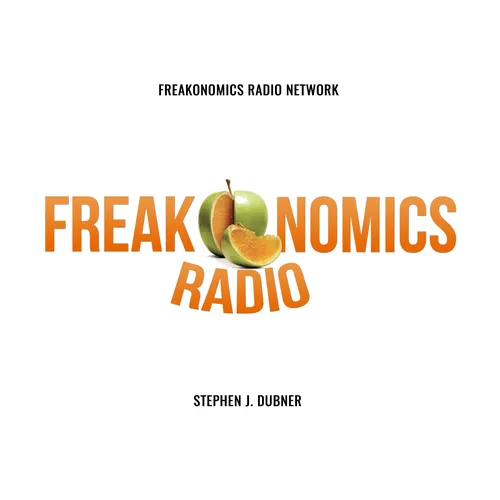
Freakonomics Radio
Freakonomics co-author Stephen J. Dubner uncovers the hidden side of everything. Why is it safer to fly in an airplane than drive a car? How do we decide whom to marry? Why is the media so full of bad news? Also: things you never knew you wanted to know about wolves, bananas, pollution, search engines, and the quirks of human behavior.
To get every show in the Freakonomics Radio Network without ads and a monthly bonus episode of Freakonomics Radio, start a free trial for SiriusXM Podcasts+ on Apple Podcasts or by visiting siriusxm.com/podcastsplus.
- Update frequency
- every 5 days
- Average duration
- 41 minutes
- Episodes
- 856
- Years Active
- 2010 - 2025

56. Why Is “I Don’t Know” So Hard to Say?
Levitt and Dubner answer your FREAK-quently Asked Questions about certifying politicians, irrational fears, and the toughest three words in the English language.

55. The Perils of Drunk Walking
We know it's terribly dangerous to drive drunk. But heading home on foot isn't the solution.

54. How Is a Bad Radio Station Like Our Public-School System? (Encore)
The thrill of customization, via Pandora and a radical new teaching method

53. How American Food Got So Bad
Tyler Cowen points fingers. There's plenty of blame to go around.

51. What Makes a Donor Donate?
The science of charity, with economist John List.

50. The Truth Is Out There…Isn’t It?
There’s a nasty secret about hot-button topics like global warming: knowledge is not always power.

49. Unnatural Turkeys
Our appetite for breast meat renders our holiday birds unable to reproduce.

48. Boo…Who?
Is booing an act of verbal vandalism—or the last true expression of democracy?

47. Wildfires, Cops, and Keggers
On Election Day, most people focus on the obvious winners and losers -- that is, the candidates. But we went looking for some of the strange side effects that elections produce.

46. Misadventures in Baby-Making
We are constantly wowed by new technologies and policies meant to make childbirth better. But beware the unintended consequences.

45. Those Cheating Teachers!
High-stakes testing has produced some rotten apples. But they can be caught.

44. Where Have All the Hitchhikers Gone?
Did we needlessly scare ourselves into ditching a good thing? And, with millions of cars driving around with no passengers, should we be rooting for a renaissance?

43. The Decline and Fall of Violence
The world is a more peaceful place today that at any time in history -- by a long, long shot.

42. The Upside of Quitting
You know the saying: a winner never quits and a quitter never wins. To which Freakonomics Radio says … Are you sure?

41. The Folly of Prediction
Human beings love to predict the future, but we're quite terrible at it. So how about punishing all those bad predictions?

40. The Suicide Paradox
There are more than twice as many suicides as murders in the U.S., but suicide attracts far less scrutiny. Freakonomics Radio digs through the numbers and finds all kinds of surprises.

39. The Economist’s Guide to Parenting
Think you know how much parents matter? Think again. Economists crunch the numbers to learn the ROI on child-rearing.

38. The Church of "Scionology"
We worship the tradition of handing off a family business to the next generation. But is that really such a good idea?

37. Mouse in the Salad
In restaurants and in life, bad things happen. But what happens next is just as important.
